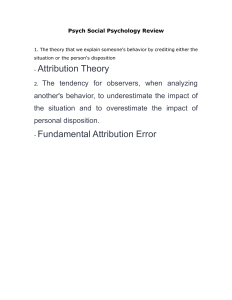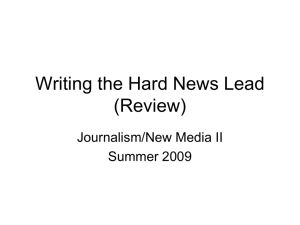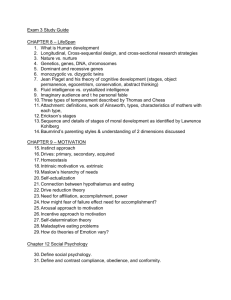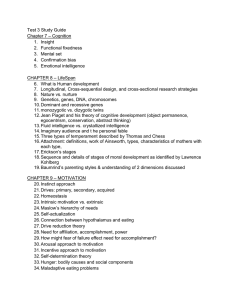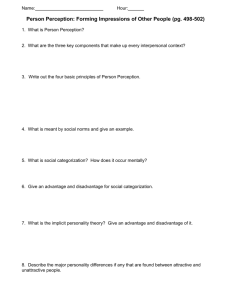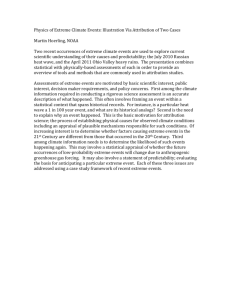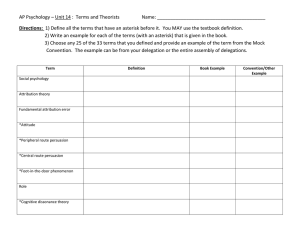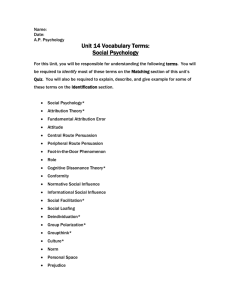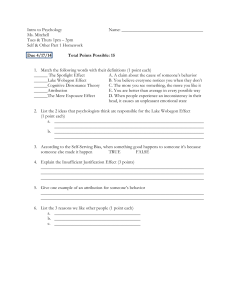Social Psychology - fernandezappsych
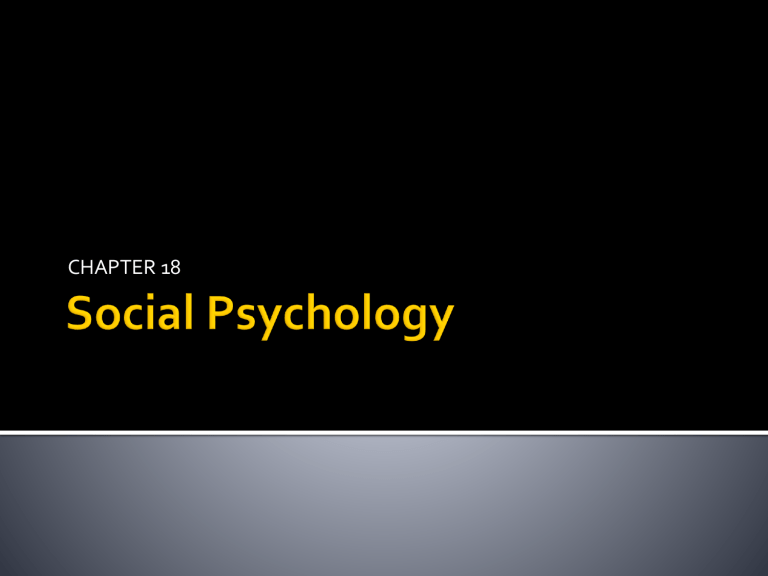
CHAPTER 18
Social Psychology – the study of how other people influence an individual’s thoughts, feelings, and actions.
Social Psychologists – study how we influence and relate to one another
Note: Social psychologists tend to emphasize external social forces and the environment. If you like this chapter then you will like Sociology.
If you were to get 50 hours of tape of people riding on an elevator…
Q.What kinds of observations would you make as a social psychologist.
Q What kind of research is this?
Q How could I turn this into an experimental research study?
Jazzy Elevator Music
Gender, Race, Class, Age, Latinos, Italians,
Height, sunglasses
Hilarious social norms project
Social Norms- cultural expected rules of behavior.
Assignment: Due next Friday (A Day) and next Monday (B Day). Break a social norm
(expected rules of behavior in society) then write a half page explaining 1) what you did
2) how people reacted and 3) how you felt while doing it. You can do this as a group.
BE SMART- DO NOT BREAK A LAW
Cafeteria Social Norm Violation
FND Films - Breaking the Social Norm disrupting a social norm- bathroom drumming grand central station freeze
Improv Everywhere - Food Court Musical
Drive-thru prank leaves workers questioning reality
Attribution Theory – We tend to give causal explanation for someone’s behavior often by crediting either the situation (external circumstances) or the person’s disposition
(internal characteristics).
Ex. You are late
If your teacher attributed lateness or misses homework to disposition:
▪ You’re careless, unreliable, absent-minded
If your teacher attributed lateness to situation:
▪ There was a wreck, lots of other homework
▪ Cut off in car (p.726)
Fundamental Attribution Error – (When considering other’s behavior) Our tendency to attribute the cause of behavior to disposition
(personality) rather than the environment.
We tend to overestimate the personality traits and underestimate the influence of the situation when explaining other’s behavior.
Ex. We tend to think “Crazy Driver,” “Careless
Employee” and “Rude Waiter”
Fundamental Attribution Error is less likely to occur in collectivist cultures
Behavior Johnny is misbehaving everyday in
8 th grade science Q Why?
Q External Situation OR internal disposition
(biology, traits)
Bill Strong Experiment- Teachers committed the Fundamental Attribution Error
Q Consider themselves to be a good driver?
Q Situation where other drivers committed the fundamental attribution error on you?
We are much more likely to see the situation when attributing our own behavior versus others.
Footage of Stanford prison Study
Self-serving bias – explaining our successes by our dispositions (internal) and our failures by the situation (external). We tend to take more credit for the good outcomes.
Ex. A student receiving a test score
▪ If you get an A – you’re intelligent
▪ If you get a D – the questions were unfair
▪ Note: When explaining our own behavior, we are aware of the change in situation (Tend not to commit attribution error)
Just-World Belief (a.k.a. just world phenomenon)– misfortunes fall on people that deserve them, (those more fortunate in life are more likely to have this point of view, tendency to blame the victim.
Ex. Political effects of attribution Re: bottom p.725
Ex. That student deserved to fail because he did nothing all year.
Ex. Happily married couples are more likely to blame their spouses tart remarks situationally rather than personal dis.
